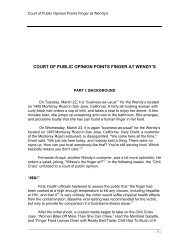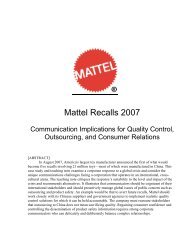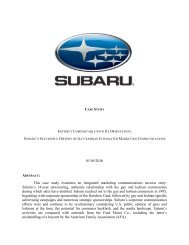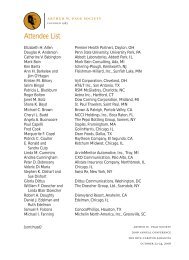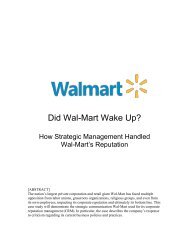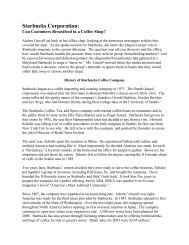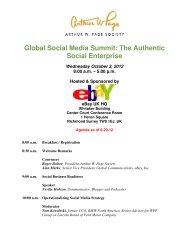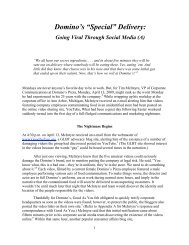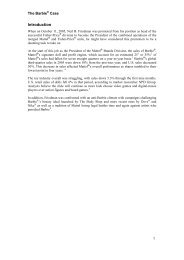The Barbie Case - The Arthur Page Society
The Barbie Case - The Arthur Page Society
The Barbie Case - The Arthur Page Society
You also want an ePaper? Increase the reach of your titles
YUMPU automatically turns print PDFs into web optimized ePapers that Google loves.
that Prince’s efforts were a “good start” but that he would<br />
need to distance himself from former administration that did<br />
not put compliance first. “Rethinking his board, bringing in<br />
new blood would be quite helpful,” said Elson. He added that<br />
Sandy Weill must go, “I think that Mr. Weill’s complete<br />
retirement from the company would go a long way to<br />
distance Mr. Prince from the earlier regime.” 21<br />
<strong>The</strong> Departure of Weill’s Army<br />
A few months after Prince’s plan was announced, Robert B.<br />
Willumstad, Citigroup’s President, COO and Director<br />
announced that he was going to leave to become a chief<br />
executive of a public company. Willumstad had a key role in<br />
creating Citigroup in 1998 with the combination of Travelers<br />
Group and Citicorp. During his tenure as Chairman and<br />
CEO of the Global Consumer Group at Citigroup, the<br />
company witnessed strong profit growth and several<br />
successful acquisitions. Willumstad worked closely with<br />
Charles Prince and Sandy Weill for years, and was very<br />
disappointed when he was not chosen as CEO. 22<br />
In the same month, Weill stated that he wanted to end his<br />
contract early, and launch a private-equity fund. <strong>The</strong>re are<br />
reports that he is frustrated by Prince’s Five Point Plan and<br />
the Traveler’s Group transaction. One bank analyst stated,<br />
“Sandy always told me he preferred to fix things as opposed<br />
to sell them.... I’m sure he hated (the Traveler’s Group)<br />
sale.” 23 Weill has decided to stay on until April of 2006 due to<br />
conflicts of interest and information access.<br />
A month after the announcements about Willumstad and<br />
Weill, Marjorie Magner announced her plans to leave as well.<br />
Marjorie was the chairman and chief executive of the Global<br />
Consumer Group segment of Citigroup. Magner plans to<br />
pursue a career change outside the financial services<br />
industry. 24 She was among the highest-ranking women at<br />
Citigroup, and her group contributed more than half of the<br />
bank’s income over the last several years. Executives at<br />
Citigroup knew that Magner disagreed with Prince’s plan and<br />
major changes. Prince responded to Magner’s announcement<br />
by saying that she was one of the “legends who built<br />
Citigroup,” and that he is “most proud” of the people she is<br />
developing, including her successors. 25<br />
On a more positive note, Saudi Prince Alwaleed bin Talal,<br />
Citigroup Inc’s biggest investor, said chief executive Charles<br />
Prince would need more time to prove himself as head of<br />
world’s largest financial-services firm. “This company is a<br />
giant,” Alwaleed said, “You have to give him time to institute his<br />
culture and way of thinking. I’m backing them all the way.” 26<br />
Prince’s Response<br />
arthur w. page society<br />
Charles Prince said of all these initiatives, “<strong>The</strong> real question<br />
is, can we execute it in a way that becomes more embedded?<br />
<strong>The</strong> systems are designed to provide sticks. This will all tie to<br />
how you pay people. People who don’t complete the required<br />
training, for example, won’t receive bonuses. If we don’t pay<br />
people the right way, the initiatives risk becoming no more<br />
than cynical happy-talk.” 27 Prince acknowledged that he has<br />
to own this program. He said, “If we delegate this to the<br />
(human-resources) department, it’s not going to work”. 28<br />
Discussion Questions<br />
1. Has Citigroup grown too large to enforce corporate<br />
governance or internal controls? What effect has the<br />
organization’s size and complexity had on the continued<br />
problems?<br />
2. What effect will the new plans have on Citigroup’s<br />
investors? What can Citigroup do to mitigate negative<br />
responses?<br />
3. How can Citigroup continually communicate the<br />
reformed organizational culture to the public?<br />
4. How would you react if you were the corporate<br />
communications officer of a Citigroup competitor?<br />
5. Do you believe it is possible to enforce an ethics program<br />
with this or any other organization?<br />
6. As a corporation communications officer, what would be<br />
your method to communicate the plan to Citigroup<br />
employees and inspire change?<br />
7. Is Prince’s plan sufficient given the magnitude of the<br />
problems facing Citigroup?<br />
8. Who are the critical stakeholders? How should Prince<br />
handle the stakeholders’ responses and concerns?<br />
39



